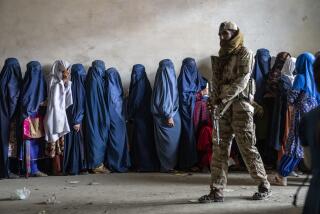What’s in a Word? In Beijing, Lots : Conference: Delegates at women’s forum interpret key phrases in a variety of ways. Final document will require consensus.
- Share via
BEIJING — Thousands of governmental delegates opened debate on human rights, sexual rights and female victims of war on the fourth day of the U.N. Fourth World Conference on Women, following the departure of high-profile visitors such as First Lady Hillary Rodham Clinton and Pakistani Prime Minister Benazir Bhutto.
With headsets tucked under turbans and hidden in hijabs , the head scarves of devout Muslim women, delegates listened in six languages to talks on the proposed “Platform for Action,” the document they will take home to their governments as a guideline for improving women’s status.
Subcommittees wrangled all day over single words or phrases that can symbolize much larger issues.
The phrase sexual rights , for example--a key subject of Thursday’s debate--bristles with different meanings for different people. To the Iranians cloaked in black burkas , sexual rights suggests unacceptable sexual license. To the representative from Nigeria, it means the right to ask a truck-driver husband, who may bring AIDS home from the road, to wear a condom.
To a lesbian activist, the term may mean freedom from discrimination based on sexual orientation. To an American advocate, it’s about being able to say no to sex within marriage, or yes to it outside matrimony.
With so many interpretations and implications, reaching consensus can be a struggle. “We must look at what could be possible misinterpretations as well as what could be possible interpretations,” said John Mathiason, a U.N. spokesman. “No doubt we will work through the weekend.”
To prevent misunderstandings, fresh translators are flying in today. But the delegates--and the grass-roots activists hoping to influence them--get no relief. On the fourth day of nonstop efforts at persuasion, lobbyists had bloodshot eyes and were grabbing quick naps on couches. One woman pillowed her head on a stack of the “Platform for Action.”
*
One U.S.-based group still had the energy to spread its message that women must have the freedom to plan when to have families and how large they will be. Like a SWAT team, the group staked out key positions in the conference hall, armed with cellular phones and bundles of pamphlets as its members waited for key delegates. One ran up the down escalator to catch a passing target.
“The Americans and Europeans here are so well organized,” sighed a woman from Ghana. “We can’t compete with that.”
“Sister, it’s another losing battle,” said her friend.
But the battle is not as difficult as preliminary meetings had promised. In New York in April, several countries objected to the word gender , claiming it legitimized homosexuality. The Vatican had suggested it would reopen agreements made at a 1994 Cairo population conference that contraception and abortion should be legally available.
Before the Beijing meeting began, about two-thirds of the document was in brackets, signifying passages over which there was disagreement.
Brackets dropped quickly, though, when a working group dispensed with the gender argument, stating the word had no hidden meanings, and the Vatican’s representatives reaffirmed they would let earlier agreements stand. “It’s moving much faster than expected,” said Dottie Lamm, a U.S. delegate from Denver. At the New York preparatory meeting, she recalled, “every time we thought something was solved, something else got nixed. So you never know.”
Almost all sides insist that they are here to move forward. “This document is intended to protect and defend the rights of women,” said Geraldine Ferraro, vice chair of the U.S. delegation. “We don’t want to go back. We don’t want to reopen it.”
The United Nations will monitor signatories on how well they follow through on commitments to equal opportunities for women, even though the document is not legally binding.
Meanwhile, as Mrs. Clinton headed for Mongolia on Thursday after implicitly condemning China’s family planning programs earlier in the week, Beijing suggested that the First Lady mind her own business.
Foreign Ministry spokesman Chen Jian, without naming Mrs. Clinton, urged critics to “clean their own courtyards.” Noting that “some people from some countries made some indiscreet remarks or criticisms,” Chen said: “We would like to caution these people to pay more attention to the problems prevalent within their own countries.”
(BEGIN TEXT OF INFOBOX / INFOGRAPHIC)
How to Reach Participants
Here are telephone and fax numbers and an Internet address for delegates and other participants of the U.N. Fourth World Conference on Women:
U.S. delegation in Beijing
011-86-10-492-5100
011-86-10-492-4400
011-86-10-492-4300
011-86-10-492-4200
011-86-10-492-5300 (fax)
011-86-10-492-4100 (fax)
U.N. Public Information Office
in Beijing
011-86-10-492-2262
U.N. liaison office in New York:
212-963-5086
212-963-3463 (fax)
WomensNet home page on the Internet
https://www.igc.apc.org
More to Read
Sign up for Essential California
The most important California stories and recommendations in your inbox every morning.
You may occasionally receive promotional content from the Los Angeles Times.










